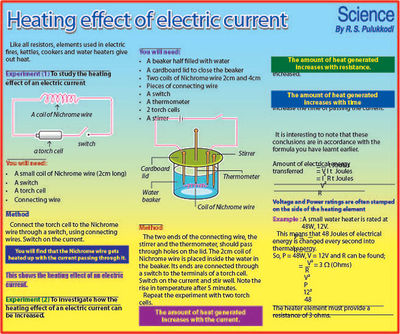Difference between revisions of "Electricity"
Seema Kausar (talk | contribs) |
Seema Kausar (talk | contribs) |
||
| Line 36: | Line 36: | ||
#[https://www.khanacademy.org/science/physics/electric-charge-electric-force-and-voltage Electricity: Khan Academy] | #[https://www.khanacademy.org/science/physics/electric-charge-electric-force-and-voltage Electricity: Khan Academy] | ||
#[http://www.explainthatstuff.com/electricity.html Simple Explanation of electricity] | #[http://www.explainthatstuff.com/electricity.html Simple Explanation of electricity] | ||
| + | |||
| + | ==Multimedia== | ||
==Reference Books== | ==Reference Books== | ||
Revision as of 15:50, 2 June 2016
| Philosophy of Science |
While creating a resource page, please click here for a resource creation checklist
Concept Map
Error: Mind Map file Electricity.mm not found
Textbook
To add textbook links, please follow these instructions to: (Click to create the subpage)
Additional information
Useful websites
- Electricity Wikipedia
- What is electricity?
- Electricity: Khan Academy
- Simple Explanation of electricity
Multimedia
Reference Books
Teaching Outlines
Concept #
Learning objectives
Notes for teachers
These are short notes that the teacher wants to share about the concept, any locally relevant information, specific instructions on what kind of methodology used and common misconceptions/mistakes. ===Activity No # ===heating effect
- Estimated Time
30minutes
- Materials/ Resources needed
electric source, thin copper wire, cellcap, key stop watch, thermometer, wires.
- Prerequisites/Instructions, if any
1. Do not use A.C. current 2. make a copper spring carefully 3. use only the thin copper wire.
- Multimedia resources
- Website interactives/ links/ simulations
- Process (How to do the activity)
take 20cm of thin copper wire, winding it on a pen refill, and carefully take out to make it like a spring
connect the copper spring to 3 volt electric source, record the temperatures of after 5 minutes and 10 minutes
connect the copper spring to 6 volt electric source, record the temperatures of after 5 minutes and 10 minutes
connect the copper spring to 9 volt electric source, record the temperatures of after 5 minutes and 10 minutes
- Developmental Questions (What discussion questions)
1. what are the factors depends upon the produced heat energy 2. what happens when electric current supplied through a thick conductor For small and large amount of electricity ? 3. list the consequences of heating effect of electric current
- Evaluation (Questions for assessment of the child)
- Question Corner
Activity No 1
- Estimated Time
30minutes
- Materials/ Resources needed
electric source, thin copper wire, cellcap, key stop watch, thermometer, wires.

- Prerequisites/Instructions, if any
1. Do not use A.C. current
2. make a copper spring carefully 3. use only the thin copper wire.
- Multimedia resources
- Website interactives/ links/ simulations
- Process (How to do the activity)
take 20cm of thin copper wire, winding it on a pen refill, and carefully take out to make it like a spring
connect the copper spring to 3 volt electric source, record the temperatures of after 5 minutes and 10 minutes
connect the copper spring to 6 volt electric source, record the temperatures of after 5 minutes and 10 minutes
connect the copper spring to 9 volt electric source, record the temperatures of after 5 minutes and 10 minutes
- Developmental Questions (What discussion questions)
- what are the factors depends upon the produced heat energy
- what happens when electric current supplied through a thick conductor For small and large amount of electricity ?
- list the consequences of heating effect of electric current
- Evaluation (Questions for assessment of the child)
- Question Corner'
Concept #
Learning objectives
Notes for teachers
These are short notes that the teacher wants to share about the concept, any locally relevant information, specific instructions on what kind of methodology used and common misconceptions/mistakes.
Activity No #
- Estimated Time
- Materials/ Resources needed
- Prerequisites/Instructions, if any
- Multimedia resources
- Website interactives/ links/ simulations
- Process (How to do the activity)
- Developmental Questions (What discussion questions)
- Evaluation (Questions for assessment of the child)
- Question Corner
Activity No #
- Estimated Time
- Materials/ Resources needed
- Prerequisites/Instructions, if any
- Multimedia resources
- Website interactives/ links/ simulations
- Process (How to do the activity)
- Developmental Questions (What discussion questions)
- Evaluation (Questions for assessment of the child)
- Question Corner
Project Ideas
Fun corner
Usage
Create a new page and type {{subst:Science-Content}} to use this template
